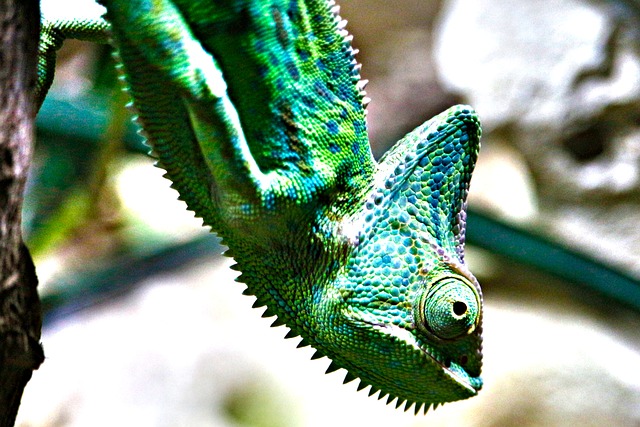Feeding of the Yemen Chameleon or Calyptratus - How often, How much?


- Feeding Live Insects
- Amount of Food
- Feeding Frequency for Adult Chameleons
- Feeding Frequency for Juvenile Chameleons
- Variety of Insects
- Calcium Powder
- Multi-vitamin Supplement
- Fruit and Vegetables
- Vegetation for Extra Nutrition
- Appropriate Food Size
- Removing Uneaten Insects
- Monitoring Weight
- Seeking Specialist Advice
Feeding Live Insects
Feeding live insects is an essential part of the Yemen chameleon's diet. These insects provide the necessary nutrients and hydration that the chameleon needs to thrive. Some suitable live insects for feeding include crickets, locusts, cockroaches, and worms. These insects can be easily purchased from pet stores or bred at home.
Amount of Food
The amount of food to feed a Yemen chameleon will vary depending on its size and age. It is important to provide enough food to meet their nutritional needs without overfeeding them. A general guideline is to offer an amount of insects that is approximately the size of the chameleon's head.
Feeding Frequency for Adult Chameleons
Adult Yemen chameleons should be fed every other day. This feeding schedule allows them to digest their food properly and prevents them from becoming overweight. It is important to observe the chameleon's behavior and adjust the feeding frequency accordingly. If the chameleon appears hungry or is losing weight, it may be necessary to increase the feeding frequency.
Feeding Frequency for Juvenile Chameleons
Juvenile Yemen chameleons have higher energy requirements and may need to be fed more frequently than adults. It is recommended to feed them daily to ensure they receive enough nutrients for growth and development. As they mature, their feeding frequency can be gradually reduced to match that of adult chameleons.
Variety of Insects
Offering a variety of insects is important to provide a balanced diet for Yemen chameleons. Each type of insect has its own nutritional profile, so by offering a variety, you can ensure that the chameleon receives a wide range of nutrients. This can be achieved by rotating the types of insects fed, such as crickets one day, locusts the next, and so on.
Calcium Powder
Calcium is a crucial mineral for Yemen chameleons, as it is essential for bone health and proper muscle function. Dusting the live insects with calcium powder before feeding them to the chameleon helps ensure that they receive an adequate amount of calcium. It is recommended to dust the insects with calcium powder five days a week.
Multi-vitamin Supplement
In addition to calcium, Yemen chameleons also require other vitamins and minerals for optimal health. A multi-vitamin supplement specifically formulated for reptiles should be used to provide these essential nutrients. Dust the live insects with the multi-vitamin supplement two days a week to ensure the chameleon receives a well-rounded diet.
Fruit and Vegetables
While live insects form the majority of a Yemen chameleon's diet, it is also beneficial to offer some fruit and vegetables. These can be provided as a small percentage of the chameleon's overall diet to add variety and additional nutrients. Some suitable options include diced fruits like apples or berries, as well as leafy greens such as kale or collard greens.
Vegetation for Extra Nutrition
In addition to fruit and vegetables, Yemen chameleons can benefit from having access to vegetation in their enclosure. This can include live plants such as pothos or ficus, which not only provide additional nutrition but also create a more natural and stimulating environment for the chameleon.
Appropriate Food Size
When feeding Yemen chameleons, it is important to ensure that the size of the food items is appropriate for the chameleon to consume. The insects should be small enough for the chameleon to easily capture and swallow without any difficulty. Offering insects that are too large can pose a choking hazard or cause digestive issues.
Removing Uneaten Insects
After feeding, it is important to remove any uneaten insects from the chameleon's enclosure. Leaving uneaten insects in the enclosure can not only cause stress to the chameleon but also attract pests or lead to unsanitary conditions. Regularly clean the enclosure to maintain a healthy environment for the chameleon.
Monitoring Weight
Monitoring the chameleon's weight is an important aspect of their care. Regularly weigh the chameleon using a reptile scale to ensure they are maintaining a healthy weight. If the chameleon is losing weight or appears undernourished, it may be necessary to adjust the feeding schedule or seek veterinary advice.
Seeking Specialist Advice
If you have any concerns about the feeding of your Yemen chameleon or if you are unsure about specific dietary recommendations, it is always best to seek advice from a reptile specialist or veterinarian with experience in chameleon care. They can provide personalized guidance based on the individual needs of your chameleon.


Related posts